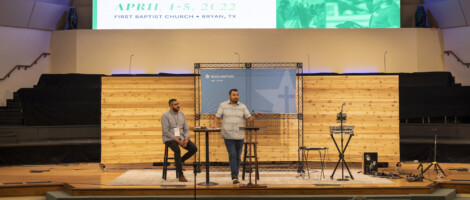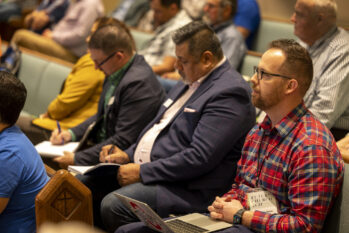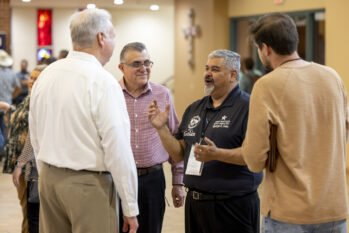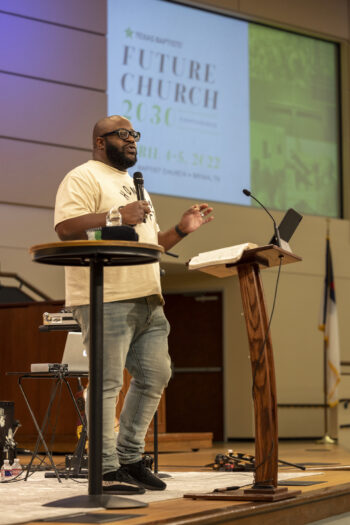Future Church 2030 Conference helps church leaders look forward to the future with confidence
by Bonnie Shaw on April 7, 2022 in News

“It is our hope and prayer that everything we learn here makes a big Kingdom impact for the days, weeks and years to come,” Texas Baptists Executive Director David Hardage said as he kicked off the Future Church 2030 Conference.

The conference focused on preparing church leaders for the year 2030 and the cultural, technological and demographic changes that will happen in the coming years. It took place on April 4-5 at First Baptist Church in Bryan.
Over 300 church leaders attended the conference, hearing from a variety of nationally-recognized speakers, local pastors and Texas Baptists ministry leaders. Subjects ranged from leading through a crisis to incorporating technology into your church’s operations. Each session ended with a question and answer portion, where attendees could ask session leaders to speak more in-depth on certain topics.
The future is here
On Monday afternoon, Beto Gonzalez and Ariel Martinez, Global Compassion & Spanish Ministry pastor and campus pastor at Del Sol Church in El Paso, respectively, spoke about engaging the growing Hispanic demographic in Texas. They urged churches to make a space for Hispanic people in their church and to help raise up Hispanic church leaders. They explained that, above all, Hispanics value work, family and cultural religious belief. By creating events that promote the family and provide opportunities for the church’s Hispanic ministry and non-Hispanic ministry to come together, churches can create a space where their changing communities feel like they belong.

“We have to be intentional about reaching Hispanics and we have to be intentional about training hispanic leaders,” Martinez said.
During his message, Steve Bezner, pastor of Northwest Church Houston, explained that the future church needs to be a Kingdom-first church. He explained that the COVID-19 pandemic revealed some of the instabilities that churches were already facing and brought them to the forefront. He said that churches need to focus on creating a Kingdom community, not a community of consumers. He also reminded churches to be involved in the community, mission-minded and making disciples.
“There’s something about each of us that comes alive when we decide to look beyond ourselves and wash the feet of our neighbors,” he said.
Director of the Center for Cultural Engagement Katie Frugé spoke on issues of identity, presence and purpose facing the future church. She explained that there has been an increase in anonymity on the Internet.
“If the future is pushing disconnectivity in real life, then where are we connecting?” Frugé asked conference attendees.
Frugé explained that the church can be the place of connectivity that people are desperately searching for. She also reminded church leaders that though cultural issues may change, the message of the gospel and the mission of the church remains the same.
Monday night was ended with a two-part session entitled “How Not to Waste a Crisis,” which was led by Co-founder and Principal of AE Sloan Leadership Tod Bolsinger. A full recap of his session can be found here.
Adjusting the method, not the message
On Tuesday morning, Director of Church Health Strategy Jonathan Smith spoke from the second chapter of Acts and encouraged church leaders, giving them a message of hope.
“The gospel is unstoppable,” he said. “And the gospel will come out in unexpected ways at an unexpected time through unexpected people.”
He reminded church leaders that GC2 – the Great Commission and the Great Commandment – should be the sole focus and encouraged them to get involved in revitalizing, replanting and planting churches. He recommended that churches who want to get involved with church planting contact the Center for Missional Engagement, which has had a 92% success rate in church planting.

Eric Mason, founder and pastor of Epiphany Fellowship, shared a powerful word about the future of the Black church, reaching Millennials and Gen Z and the mission of the gospel.
“Because falsehood goes out quickly, the church has to have a disposition of armor of God, spiritual unity, Christ-centeredness and a ferocious commitment to the gospel that’s beyond our differences,” he said.
Young people are struggling to find places where they can lead in the church and asking questions about what the church is doing to better the community. Mason encouraged churches to reflect on those issues and be deliberate about making a space for young believers.
Carey Nieuwhof ended the conference with his two-part session on “Why the Old Model of Church No Longer Works.” A recap of his session can be found here.
Phil Miller, director of the Center for Church Health, concluded the conference with a charge to the church leaders in attendance.
“The worst thing you can do is leave from here and do nothing,” he said. “What will you do with what you’ve learned?”
For more information about upcoming events, go to txb.org/subscribe. Sign up for the Texas Baptists Life Newsletter for a monthly overview of Texas Baptists news and ministry, or sign up for a ministry-specific newsletter.
Texas Baptists is a movement of God’s people to share Christ and show love by strengthening churches and ministers, engaging culture and connecting the nations to Jesus.
The ministry of the convention is made possible by giving through the Texas Baptists Cooperative Program, Mary Hill Davis Offering® for Texas Missions, Texas Baptists Worldwide and Texas Baptist Missions Foundation. Thank you for your faithful and generous support.
Subscribe to receive stories like this one directly to your inbox.
We are more together.
Read more articles in: News, Church Health
More from Bonnie Shaw
- 2022 Annual Meeting celebrates unwavering commitment to sharing Christ and showing love
- 2022 Missions Banquet looks towards sharing the gospel with ‘every nation, tribe and language’
- Texas Baptists messengers elect new officers, raise budget for second consecutive year
- Pastor’s Common Rally provides space for collaboration, fellowship for young ministry leaders
- Equipping believers to defend their faith in the Philippines and in Texas